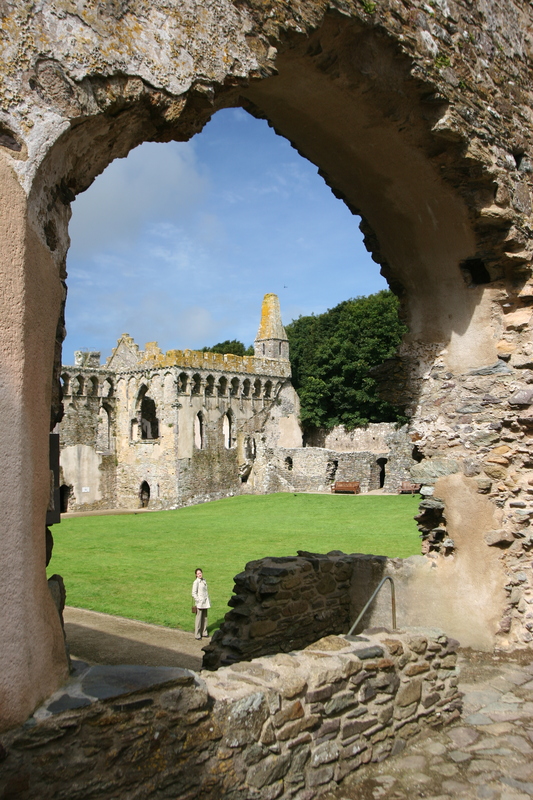|
St David's Cathedral
St Davids Cathedral ( cy, Eglwys Gadeiriol Tyddewi) is situated in St DavidsBritain's smallest city in the county of Pembrokeshire, near the most westerly point of Wales. Early history The monastic community was founded by Saint David, Abbot of Menevia, who died in 589. Between 645 and 1097, the community was attacked many times by raiders, including the Vikings; however it was of such note as both a religious and an intellectual centre that King Alfred summoned help from the monastic community at St Davids in rebuilding the intellectual life of the Kingdom of Wessex. Many of the bishops were murdered by raiders and marauders, including Bishop Moregenau in 999 and Bishop Abraham in 1080. The stone that marked his grave, known as the "Abraham Stone", is intricately carved with early Celtic symbols and is now on permanent display within the Cathedral Exhibition at Porth-y-Tŵr. In 1081, William the Conqueror visited St Davids to pray, and thus recognised it as a holy and res ... [...More Info...] [...Related Items...] OR: [Wikipedia] [Google] [Baidu] |
Church In Wales
The Church in Wales ( cy, Yr Eglwys yng Nghymru) is an Anglicanism, Anglican church in Wales, composed of six dioceses. The Archbishop of Wales does not have a fixed archiepiscopal see, but serves concurrently as one of the six diocesan bishops. The position is currently held by Andy John, Bishop of Bangor, since 2021. Unlike the Church of England, the Church in Wales is not an established church. Disestablishmentarianism, Disestablishment took place in 1920 under the Welsh Church Act 1914. As a province of the Anglican Communion, the Church in Wales recognises the Archbishop of Canterbury as a focus of unity but without any formal authority. A cleric of the Church in Wales can be appointed to posts in the Church of England, including the See of Canterbury; a former Archbishop of Canterbury, Rowan Williams, was from Wales and served as Archbishop of Wales before his appointment to Canterbury. Official name The Church in Wales ( cy, Yr Eglwys yng Nghymru) adopted its name by a ... [...More Info...] [...Related Items...] OR: [Wikipedia] [Google] [Baidu] |
Vikings
Vikings ; non, víkingr is the modern name given to seafaring people originally from Scandinavia (present-day Denmark, Norway and Sweden), who from the late 8th to the late 11th centuries raided, pirated, traded and settled throughout parts of Europe.Roesdahl, pp. 9–22. They also voyaged as far as the Mediterranean, North Africa, Volga Bulgaria, the Middle East, and North America. In some of the countries they raided and settled in, this period is popularly known as the Viking Age, and the term "Viking" also commonly includes the inhabitants of the Scandinavian homelands as a collective whole. The Vikings had a profound impact on the early medieval history of Scandinavia, the British Isles, France, Estonia, and Kievan Rus'. Expert sailors and navigators aboard their characteristic longships, Vikings established Norse settlements and governments in the Viking activity in the British Isles, British Isles, the Faroe Islands, Settlement of Iceland, Icela ... [...More Info...] [...Related Items...] OR: [Wikipedia] [Google] [Baidu] |
Pilgrimage
A pilgrimage is a journey, often into an unknown or foreign place, where a person goes in search of new or expanded meaning about their self, others, nature, or a higher good, through the experience. It can lead to a personal transformation, after which the pilgrim returns to their daily life. Background Pilgrimages frequently involve a journey or search of moral or spiritual significance. Typically, it is a journey to a shrine or other location of importance to a person's beliefs and faith, although sometimes it can be a metaphorical journey into someone's own beliefs. Many religions attach spiritual importance to particular places: the place of birth or death of founders or saints, or to the place of their "calling" or spiritual awakening, or of their connection (visual or verbal) with the divine, to locations where miracles were performed or witnessed, or locations where a deity is said to live or be "housed", or any site that is seen to have special spiritual powers. S ... [...More Info...] [...Related Items...] OR: [Wikipedia] [Google] [Baidu] |
Papal Privilege
Privilege in the canon law of the Roman Catholic Church is the legal concept whereby someone is exempt from the ordinary operation of the law over time for some specific purpose. Definition Papal privileges resembled dispensations, since both involved exceptions to the ordinary operations of the law. But whereas "dispensations exempt dsome person or group from legal obligations binding on the rest of the population or class to which they belong," “ ivileges bestowed a positive favour not generally enjoyed by most people." "Thus licences to teach or to practise law or medicine, for example," were "legal privileges, since they confer edupon recipients the right to perform certain functions for pay, which the rest of the population asnot ermitted to exercise. Privileges differed from dispensations in that dispensations were for one time, while a privilege was lasting. Yet, such licenses might also involve what should properly be termed dispensation, if they waived the canon l ... [...More Info...] [...Related Items...] OR: [Wikipedia] [Google] [Baidu] |


